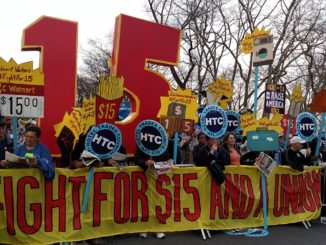Source: Dissent Magazine
“The movement was the catalyst that we needed,” Juan Luis Gaytán said, standing outside the Arca Continental plant in Matamoros, a city in the northeastern Mexican state of Tamaulipas. Gaytán works at Arca Continental, the Coca Cola production and distribution plant for the region. That morning, the workers at the plant were on strike, among the thousands of workers who have gone on strike in Matamoros since the start of 2019.
The workers at Arca Continental are also among the last who remain on strike in Matamoros, where a wave of labor militancy was kicked off by the newly elected president Andrés Manuel López Obrador’s December announcement that the minimum wage at the factories along the U.S.-Mexico border—known as maquiladoras, or maquilas for short—would rise from 88 pesos to 176 pesos, or $9 a day. Since maquila wages are pegged to the minimum, workers saw the president’s announcement—one of his first acts in office—as an opening to push for higher pay. Between January 9 and 24, workers in dozens of factories in Matamoros organized work stoppages. The wave of strikes became known as the 20/32 movement, after the workers’ demands: a twenty percent salary increase and a one-time bonus of 32,000 pesos, roughly $1,700. read more




